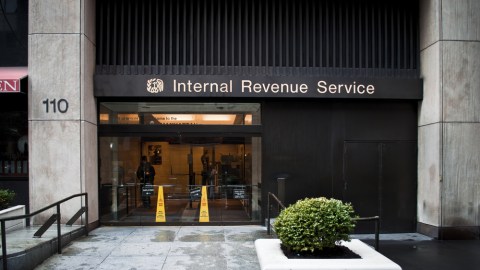An Idea Whose Time Has Come: Abolish the IRS

As Congressman Dave Camp has observed, the tax code of the United States is now ten times as long as the Bible, with none of the good news.
It is also exponentially more difficult to comply with, as there have been some 5,000 revisions made in the last dozen years. Even ancient scriptures, while challenging to willing spirits and weak flesh, can be counted on for constancy.It is axiomatic that in a free society, a law that renders comprehension and compliance impossible cannot be considered legitimate. No matter how eager citizens may be to contribute to the common purse, rendering unto Caesar what is Caesar’s, they can attain no certainty they have done so to Caesar’s satisfaction – and his dissatisfaction carries a severe cost.
Recent news that the Internal Revenue Service has been enforcing its already inscrutable doctrine with caprice and venom – directed at conservative groups, Republican donors, and supporters of Israel, among others – confirms the worst suspicions of many Americans, of all political affiliations.
There is a lot of talk in Washington, and across the country, of a desire to reach bipartisan accord and accomplish great things. Here is an opportunity for just that.
Over the course of several election cycles, what was once a fringe notion advanced by long-shot candidates (Mike Huckabee and Ron Paul, please call your offices – or call each other, or call me, as you wish) has crept closer to the mainstream. To wit, it is time to abolish the IRS.
The very title, “Internal Revenue Service” contains multiple falsehoods. First off, the IRS is not solely concerned with revenues that are “Internal.” Anomalous among the nations of the world, America’s tax authority assumes for itself power over citizens, their families, and “US persons” living abroad, requiring them to file and pay taxes at US rates, even if they have not set foot on American soil in decades – or ever. “Taxation without representation,” indeed.
Wherever in the world your eyes find these words, the IRS very likely believes it has business with you. If you are married or related to an American, or in business with one, or if you have held US residency or even a visa at some time, the IRS can compel your financial institution to provide information on your assets and activities, threatening overwhelming sanctions for non-compliance.
Really, should the “Land of the Free” allow this mendacious and predatory agency to infect other nations in such a manner?
Second, the IRS has long since expanded beyond the concerns of mere “Revenue” to become the arbiter of almost every aspect of American life: free speech, charitable giving – even, Saints preserve us, health care.
The recent imbroglio, involving the slow-walking and hard-questioning on applications by right-of-center policy groups for tax-advantaged status, reminds us that America’s marketplace of ideas is overseen by government collectors. As columnist George Will notes, “Remember, all campaign ‘reform’ proposals regulate political speech. And all involve the IRS in allocating speech rights.”
Finally, the notion that the IRS offers a “Service” constitutes an absurdity of government-speak that would make Orwell guffaw, if there were any historical evidence that he was capable of doing so.
This fiction is usually exploded when an average citizen first hears from the IRS regarding questions they have or an audit they plan to conduct (and if you have not heard from the IRS, with the onset of Obamacare, buckle up).
That first contact will almost certainly be undersigned by a “Mr. Gossage” or a “Mrs. Vardebedian,” with no Christian name in sight, like a teacher writing their name on the blackboard on the first day of school. This introductory dynamic could only seem like a good idea to lifetime government hangers-on, benighted to the fact that in the real world, adults trust one another with their first names.
The effect is just silly, like a small child donning his father’s suit and shoes, shuffling around the house and demanding to be called “Mr.” before he’ll help tidy the rumpus room. But the intended message is unmistakable: We are in authority over you. Some “Service,” that.
And it is precisely that overbearing, ham-handed institutional culture that is evinced by this latest and growing scandal. The IRS initially claimed it was all the work of low-level employees in its Cincinnati office, undertaken without direction from senior staff or the Obama administration. This was obviously a lie from the first, if only because it presupposed professional initiative taken by career civil servants.
Confirmed reports of targeted audits, inappropriate questions and harassment emanating from at least three other IRS offices around the country have eviscerated this laughable line of defense.
But let us suppose it were true. Should a nominally free country countenance the harassment of its citizens, at home and abroad, by Mr. or Mrs. Cough-It-Up who, having overcome the unspeakable tragedy of having no given name, nevertheless demands to know everything about you?
It has only been 100 years since the United States ratified taxation of income. That’s considerably less than half of the nation’s lifetime (and lest we forget, the Republic came into being, in large measure, out of rebellion against unfair taxation), so let’s not get our aprons over our heads about making changes now.
This column would rather light a candle than curse the darkness. Herewith, therefore, are a couple of alternatives, offered for consideration:
First, toss the entire US tax code into the ocean (though someone tell Al Gore first, lest he begin shrieking when the sea level rises). Then, establish a small agency, charged with only one task: To withhold 15 percent of earned incomes over $50,000.
Assuming this sounds too much like a flat-tax prescription that would come from one of those Tea Party groups the IRS decided to hassle and stonewall in the first place, we can play with the numbers to get bipartisan buy-in. For instance, we could have two or three rates on a progressive scale – 10, 15, and 20 percent, let’s say – but once we agree, that’s it: no deductions, no investment or estate taxes, we’re done. Donate to whomever you wish, buy whatever health care you’d like (or not), and do so without tax benefit, but without tax bother, either.
Even if, as some may suggest, this route simply replaces one dysfunctional and malign agency with another, a new collections bureau with a minimalist mandate should take at least another 100 years to become as officious and unpleasant as today’s IRS, at which time we can discuss reform anew (watch this space).
But for the truly skeptical, perhaps a consumption tax is the thing. This has variously been advanced as a Fair or Value-Added Tax, and it is simply a levy on all transactions, usually proposed at 20 to 23 percent, that replaces income taxes altogether. This is reflexively denounced as “regressive” by the Left and the experience of Great Britain is instructive; specifically, instead of using the VAT to replace tax on income, as was proposed, authorities simply slapped the VAT on top of the UK’s already punitive rates.
Even so, a VAT necessitates that the more you spend, the more you pay. That seems straightforward enough, and it ensures the burden of funding government is carried by those most able to do so.
It is perhaps Victor Hugo’s best-known sentiment that nothing is as powerful as an idea whose time has come. Hugo, who wrote timelessly and interminably on the vicissitudes of oppressive bureaucracy, included this aside in Les Miserables: “It may be said that there is one infallible thermometer of the public misery and riches— the cost of collecting the taxes.”
If that is true, and accepting Hugo’s attendant observations that such cost is inversely proportionate to overall economic health, why not make taxation simple and transparent for everyone?
One hopes he would agree that abolishing the IRS is an idea whose time has come.
This post originally appeared in The Daily Caller.
Theo Caldwell, an international investor and broadcaster, has been a member of the New York Stock Exchange, the Chicago Board Options Exchange, the American Stock Exchange, and the Kansas City Board of Trade. He can be reached at theo@theocaldwell.com




